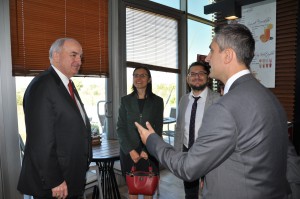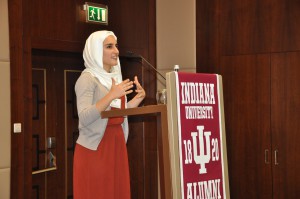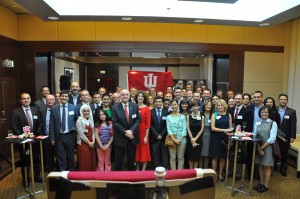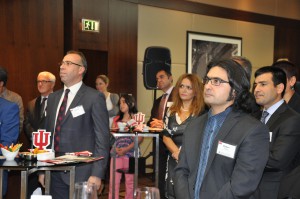Finding new partners, reconnecting with old friends in Ankara
One of the first things you notice as you motor up the hills leading to the sprawling 11,000-acre campus of Middle East Technical University is the forest alongside the main road, which wouldn’t be quite so noticeable if you hadn’t previously discovered that the landscape of Ankara, the capital city of Turkey, is largely brown and treeless.
The trees, several of which, we later learned, were planted by METU faculty and students, reflect the remarkable growth of a university which, since its inception as a state university in 1956, has become one of Turkey’s top — and most internationally focused — institutions of higher education.
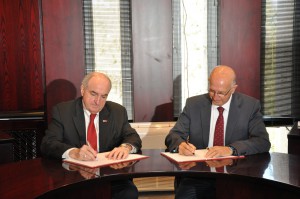
IU President Michael A. McRobbie and METU President Ahmet Acar sign an agreement between their universities.
With more than 110,000 alumni, 24,000 students, 1,800 international students, 1,200 full-time faculty, 43 undergraduate degree programs, 24 interdisciplinary research centers and one major technology park (more on that in a bit), METU has also developed into one of Turkey’s most intensely competitive universities, with most of its departments accepting only the top 1 percent of the approximately 1.5 million applicants taking Turkey’s National University Entrance Examination.
Today, it is widely recognized as the leading university in Turkey in terms of depth and breadth of international ties and the amount of funds it generates from a wide range of international research projects.
A new partnership filled with potential
On Thursday, IU President Michael A. McRobbie and members of his delegation arrived here at METU to learn more about this accomplished university, talk about IU’s plans to enhance its longstanding engagement in Turkey and, most importantly, sign a new agreement of friendship and cooperation between the two institutions, which, not surprisingly, share a number of common interests and objectives.
While IU and METU have already collaborated in recent years on a number of successful projects, the new agreement will enable even greater opportunities for research and study for students and faculty at both institutions, and today’s productive discussions signaled great potential for collaborative exchanges in academic disciplines in which IU possesses considerable strengths, including, among other areas, business and economics, computer science and informatics, public and environmental affairs, and the social and physical sciences.
From a singularly IU perspective, the agreement, like that signed with Boğaziçi University in Istanbul several days ago, will also dramatically enhance the university’s historic presence in Turkey, which dates back 70 years, and its intention to markedly expand its educational and research connections all across this vitally important region of the world.
“I’m sure there will be many good synergies between our two universities,” METU President Ahmet Acar told members of the IU delegation as the group prepared to depart for yet another striking indication of METU’s prominence and pursuit of greater research productivity: the ODTU Teknokent-METU Technopark.
Initially conceived in the 1980s, launched with the support of a small business administration in Turkey and continually developed throughout the ensuing decades, the Technopark lives up to its METU-drawn moniker as “the first, biggest and most innovative science and technology park of Turkey.” This major business incubator has spawned numerous industry-university collaborations aimed at research, software and technology development, and it boasts a most impressive scale of transferring new technologies to the global marketplace.
What’s more, the Technopark offered an ideal and inspiring location for our final activity at METU: a working lunch with President Acar and 15 of his faculty colleagues. Amazingly, more than half of our hosts were graduates of IU, further reflecting the remarkably strong connections between IU and METU and the strong potential inherent in this new and exciting partnership.
Understanding and making an impact in contemporary Turkey
From METU, the delegation traveled back down the Ankara hillside to a meeting at Turkey’s Higher Education Council, known as Yükseköğretim Kurulu Başkanlığı or YÖK, which governs the country’s university system and manages educational initiatives like the Mevlana program, which enabled IU’s new agreement with Boğaziçi University.
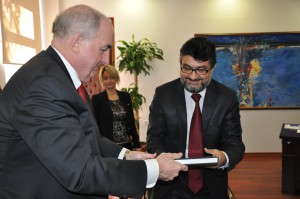
IU President McRobbie presents a gift to Şaban Çalış, deputy chair of Turkey’s Higher Education Council, known as YÖK.
While at YÖK, IU President McRobbie and council Deputy Chairman Şaban Çalış discussed IU’s commitment to building upon its long and successful Turkish studies programs to develop greater faculty expertise and resources devoted to modern-day Turkey, the extraordinary transformation that has taken place here over the last several decades and Turkey’s strategically important role in current global affairs. The two also chatted about IU’s plan to open its new global gateway facility in Istanbul, a well-received topic at every meeting we’ve attended thus far, and how their respective institutions might work together in the future to assist Turkish society through the development of more advanced human capital across the country.
From there, it was a short drive to the Ministry of Foreign Affairs, where similar talks were held between McRobbie, Deputy Minister Ali Naci Koru and their respective colleagues. The deputy minister seemed especially pleased to learn about IU’s significant pre-existing relationship and newly signed partnership with METU, its long history of providing a warm and welcoming place for students from Turkey and around central Asia, and the university’s ambitious vision to become America’s pre-eminent center for Turkish studies, both past and present.
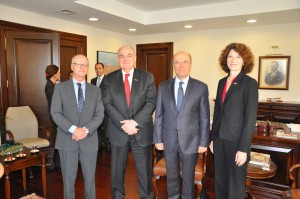
From left: IU Vice President David Zaret, IU President McRobbie, Turkish Deputy Minister Ali Naci Koru and IU first lady Laurie Burns McRobbie.
Fatih Yildiz, director of human resources and management ministry of foreign affairs, summed up the meeting nicely: “You have a vision for Turkey, and we have a vision for how Turkey should be developed. Our role now is to mesh these two visions.”
IU’s greatest resource: its alumni
Of course, behind every successful partnership, program and vision are people, and nowhere was this more evident than at the IU delegation’s final activity of a busy day: a reception for IU alumni living and working in Ankara.
The number of IU alumni in Turkey continues to grow, with about 100 Turkish students arriving at the university’s campuses each year. Indeed, Turkey consistently ranks among the top 10 nations of origin among IU’s international students, and that’s not counting the many other Turkish scholars and dignitaries who also come to teach, lecture and learn at IU.
More impressive than the sheer numbers, however, are the tremendous successes of IU’s Turkish alumni and their remarkable achievements across the entire spectrum of society here in this dynamic country, including the arts, business, communications, education, government, health care, philanthropy and more. And all of this is to say nothing of their exceptional dedication and loyalty to IU.
Tonight’s reception included welcoming remarks by IU Foundation Director of International Alumni Relations Fred Perry, an IU update by President McRobbie and an inspiring address from former IU presidential intern and recent graduate Rahaf Safi, who spoke passionately about her strong belief in the power of education and of public service. (Safi has joined the delegation on this trip to Turkey, and I hope you will get to hear directly from her in this blog space soon.)
On a strictly personal note, I had the opportunity to meet up with an old friend—and someone I suspect many folks back home in Bloomington will remember — Metin Ayvazoglu, who after opening the popular Turkuaz Café restaurant more than a decade ago, went on to earn his master’s degree from IU’s top-ranked School of Public and Environmental Affairs. Today, he is engaged in Turkish government and has designs on running for a seat in Parliament.
All in all, the reception was a terrific close to an energizing and eventful day, in which new partnerships were formed and old connections were re-established, all of which will almost certainly result in greater engagement in Turkey in the years to come.
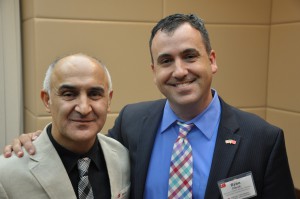
Yours truly, on the right, with friend and IU alumnus Metin Ayvazoglu, former owner of Bloomington’s Turkuaz Café.
Tags: Ahmet Acar, Ali Naci Koru, Ankara, Bogazici University, Fatih Yildiz, Fred Perry, IU Alumni Association, Metin Ayvazoglu, METU, METU Technopark, Michael A. McRobbie, Middle East Technical University, Ministry of Foreign Affairs, Rahaf Safi, Şaban Çalış, School of Public and Environmental Affairs, Turkey, Turkey Higher Education Council, YÖK



